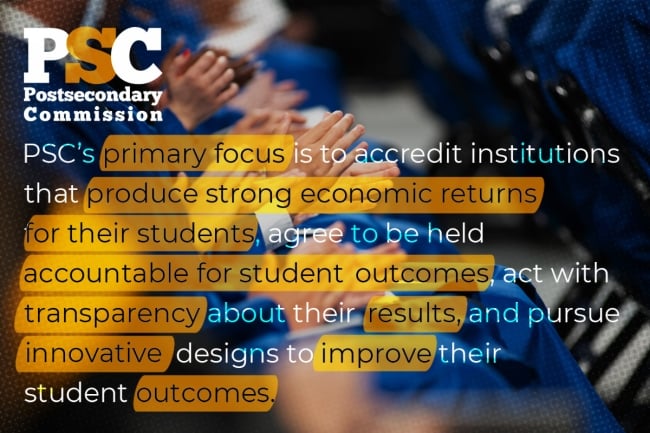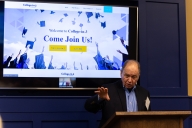You have /5 articles left.
Sign up for a free account or log in.

An aspiring new accreditor, the Postsecondary Commission, is focused on outcomes.
Photo illustration by Justin Morrison/Inside Higher Ed | ferrantraite/E+/Getty Images | Postsecondary Commission handbook
Accrediting agencies tasked with evaluating U.S. colleges and universities typically focus on metrics related to academics, operations and fiscal health. The nascent Postsecondary Commission aims to offer a different model for determining institutional quality: one centered largely on student outcomes, such as earnings and economic mobility.
But first, it actually has to become a recognized accrediting body. And while the organization has taken the initial steps to do so, it is only a year into the lengthy and arduous process, which can take at least four years.
The nonprofit, philanthropy-backed organization has a unique, outcomes-focused model and a board stocked with well-known names, but it also faces a high degree of skepticism. That’s not surprising in the world of higher education, where accreditors are rarely viewed favorably. If approved, the Postsecondary Commission will launch in an environment where institutions have newfound freedom to choose accreditors beyond their historic regions, following 2020 changes by the Trump administration that allow such bodies to operate nationally.
Focused on Outcomes
Postsecondary Commission founder and president Stig Leschly, a former charter school executive and lecturer at Harvard Business School, believes his accrediting organization fills an untapped need, given that student motivations for pursuing education are often earnings-driven.
As such, the commission is building its accreditation standards around measuring outcomes through both “absolute earnings” and “value-added” earnings. According to the commission’s published standards, institutions will meet the absolute earnings standard if the median wage for graduates is 150 percent above the poverty line for two of the three years after they complete their degrees.
On the value-added piece, PSC would require institutions to generate wage gains for both graduating and nongraduating students “that exceed the costs they charge those students.” As described on its website, the Postsecondary Commission intends to measure “wage gains as the difference between the actual wages of students and a baseline estimate of the wages those same students would have experienced if they had not enrolled in the institution.”
While the organization published its latest standards in November, Leschly provided an earlier glimpse of the model at a congressional hearing on education reform in July. In his testimony, Leschly highlighted PSC’s emphasis on economic returns, transparency, accountability and innovation.
“Our intention as an accreditor is to hold institutions accountable for generating strong economic returns for students and for acting with transparency towards them in exchange for access to Title IV aid and for wide discretion to innovate,” Leschly said at the hearing.
In a recent interview with Inside Higher Ed, he described the commission as “an appealing accreditor for a subset of institutions”—namely colleges “that are devoted to producing economic opportunity for students and that are interested in being measured fairly and accurately for that.” Those institutions include two- and four-year colleges that “take in low-income and middle-class students” and “improve their trajectory” and are often overlooked.
“As an accreditor that has a role to play in the dispensation of public aid to higher institutions, I think we can justify caring about better jobs, better wages and economic opportunity,” he said.
On its road to recognition by the U.S. Department of Education, the Postsecondary Commission is operating a pilot program for its proposed accreditation model at Texas State Technical College. Announced in December, the pilot will allow PSC to test its model as it jumps through various regulatory hoops for federal recognition, which requires aspiring accreditors to submit an application to the U.S. Department of Education and undergo a lengthy review process and various other steps.
Supporters and Detractors
While the Postsecondary Commission has a number of well-known board members and powerful philanthropic institutions backing the effort, it also has critics with lingering questions.
The Board of Commissioners includes Ted Mitchell, president of the American Council on Education; Paul LeBlanc, the outgoing president of Southern New Hampshire University; and eight other members representing colleges, think tanks and various other organizations.
“I am pleased to be working with other members of the Postsecondary Commission to explore a potential new way to articulate the value and purpose of accreditation,” Mitchell told Inside Higher Ed by email. “Finding innovative methods, in addition to strengthening existing efforts, to help institutions boost student success and be accountable for outcomes is a priority for ACE and higher education as a whole. It is early in the process, but I appreciate the thoughtful ideas and efforts that are being weighed.”
LeBlanc pointed to the potential for innovation in expressing his support for the idea.
“The real hope here is that with a strong focus on outcomes and transparency, we can encourage more innovation, new models and approaches to delivery that can better serve students not as well served by our incumbent models, without fear of poor outcomes or allowing bad agents into the higher education ecosystem,” LeBlanc told Inside Higher Ed by email.
“The beauty of the PSC approach is that it should reassure the student consumer protection folks, given its emphasis on student data, outcomes, demonstrable earning gains, and transparency. On the other hand, it should also reassure those who chafe against regulation and accreditation because they think innovation is squelched or dampened,” he wrote.
Critics, however, are skeptical.
Lanae Erickson, senior vice president for social policy, education and politics at the think tank Third Way, said by email that accrediting bodies have not done a good job on student outcomes.
“Accreditors have been willfully blind to the outcomes the institutions they approve are delivering to students and taxpayers. They’ve focused on inputs, bureaucracy, and outdated requirements and have been agnostic at best on whether or not schools actually succeed with the students they enroll,” she wrote. She added that accreditors have let colleges “cash in on taxpayer-funded grants and loans even when they know only a tiny fraction of students will complete their credential or degree” or get a job that pays more than what a high school graduate earns.
The focus on outcomes is worthwhile, Erickson said, but “the devil is in the details”—particularly if metrics such as an earnings gain are “gameable,” which she worries may incentivize bad actors.
“Allowing the current accreditation system to continue operating the way it is and approve schools that leave most of their students worse off than if they’d never enrolled is unacceptable—and if all you do is create a new accreditor that does look at outcomes, that’s what you’ll get,” Erickson wrote. “No real change to the fundamentally flawed system.”
The think tank New America sent a letter to the Postsecondary Commission’s staff and board in October, raising concerns about the initial accreditation standards the organization proposed.
“We are deeply concerned that the PSC standards fail to meet the level of specificity and rigor required of an effective accrediting agency,” New America wrote to the staff and board.
Among the concerns New America raised was PSC’s ability to fairly and accurately measure postgraduate earnings, especially across different demographics; collect the necessary longitudinal data on income; establish a minimum earnings bar in accreditation standards; accredit new programs and institutions without existing earnings data; and review institutional diversity and equity efforts. (While most accreditors have standards around diversity, equity and inclusion, that is not universal.)
New America also raised questions about the lack of specifics on curriculum design and the role of faculty, as well as standards around advertising, recruitment and admissions. It argued that PSC’s bar was too low, and it needed to be raised to hold predatory colleges accountable.
(The commission updated its standards Nov. 20 and now offers more specifics in various areas.)
Additionally, some critics have expressed concern about the timing of PSC’s ascendance, given that Florida and North Carolina have recently passed laws that require their state institutions to change accreditors regularly. Conservative lawmakers in those states proposed the legislation after the Southern Association of Colleges and Schools Commission on Colleges raised issues of academic freedom in recent years.
Leschly disputed any political motivations, as well as the notion that PSC intends to fill the void in places where colleges will be forced to change accreditors, calling the idea akin to “a wild conspiracy theory.”
But he indicated that amid creeping politicization, PSC likely won’t wade into the culture wars being waged on college campuses. Instead, it will focus primarily on outcomes.
“We’re quite strict on outcomes and very sensible and very persistent on means. There are some aspects of the day-to-day activities of institutions—and I would include their approach to super-contested issues where we won’t object to their policy, but we won’t require it, either. We become a neutral regulator there in favor of leaving institutions to resolve, in diverse and varied ways, contested topics, because students want variety,” Leschly said. “We’ll take a light touch.”








